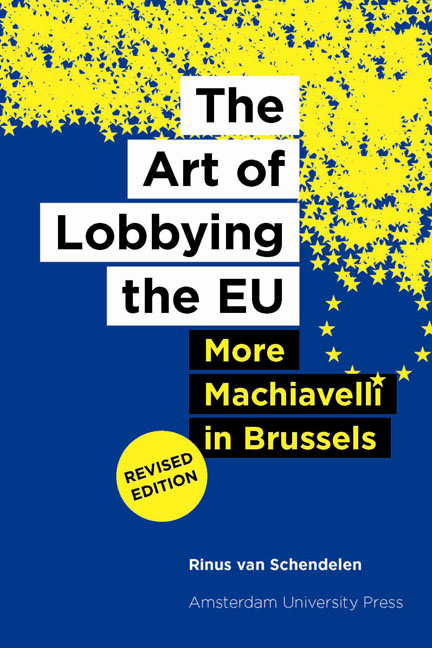Book contents
- Frontmatter
- Dedication
- Contents
- Detailed Contents
- Special Preface to the Fourth Edition: Ten Years’ Anniversary of this Book
- List of Figures
- List of Best Websites
- List of Abbreviations
- 1 The Europeanization of Public Affairs
- 2 The Playing-Field: EU Common Decision-Making
- 3 Pushing the Buttons of ‘Brussels’
- 4 Getting Grip on an EU Arena
- 5 Managing the Home Front
- 6 Managing the EU Fieldwork
- 7 The Limits of EU Public Affairs Management
- 8 Public Affairs, Lobbying and EU Democracy
- References
- Index
1 - The Europeanization of Public Affairs
Published online by Cambridge University Press: 10 December 2020
- Frontmatter
- Dedication
- Contents
- Detailed Contents
- Special Preface to the Fourth Edition: Ten Years’ Anniversary of this Book
- List of Figures
- List of Best Websites
- List of Abbreviations
- 1 The Europeanization of Public Affairs
- 2 The Playing-Field: EU Common Decision-Making
- 3 Pushing the Buttons of ‘Brussels’
- 4 Getting Grip on an EU Arena
- 5 Managing the Home Front
- 6 Managing the EU Fieldwork
- 7 The Limits of EU Public Affairs Management
- 8 Public Affairs, Lobbying and EU Democracy
- References
- Index
Summary
If wanting to launch a campaign in foreign terrain successfully, one should first study the terrain's history, geography, people and anything else that may determine success. This basic belief of Machiavelli in his Discorsi (book 3-8) is applied to the EU here. If wanting to influence EU, what should one know beforehand?
I How are we Living Together in Europe?
‘Europe’ is almost a synonym for variety or diversity. In the mid-2010s, there were almost 500 million people living in the European Union (EU), which is more than the 420 million people of the United States and Japan combined. The negotiations about entry into the Union with nine states more, from the remnants of the former Yugoslavia to Iceland and Turkey, may add more than 100 million people to the EU. All these countries have a great deal of internal diversity by ideology, ethnicity, religion, education, language, income, culture and much more [Calder and Ceva, 2011]. Their states are frequently subdivided into more or less autonomous regional, provincial and local governments that reflect different territorial and power ambitions. Their histories often have a long record of both civil wars and foreign ones with neighbours and (former) colonies. The domestic political ideologies range from extreme left to right and their religious belief-systems from Catholicism, Protestantism (in many variants), Islam and many more exotic ones, plus a substantial proportion of people who are atheists or agnostics. In their daily lives, Europeans, living in free and pluralist societies, encounter a kaleidoscope of civil organizations such as trade unions, companies, political parties, churches and other interest groups. Their economies show much diversity such as by sector, productivity, employment and regimes that range from more free-market in the north to more state-directed ones in the south (the Mediterranean) and the east (Central Europe). For communication the people of the EU rely on twenty-three different ‘official national languages’ (acknowledged as such by the EU) and hundreds of regional ones. In France alone, one-third of the population uses one of its eight recognized dialects.
In terms of socio-economic statistics, the variety in Europe is even more impressive [COM, Europe in figures]. The population size of the member state of Luxembourg is less than half a per cent of that of Germany, but has the highest GDP per capita, two and a half times that of Portugal and five times that of Latvia.
- Type
- Chapter
- Information
- The Art of Lobbying the EUMore Machiavelli in Brussels (Revised Edition), pp. 33 - 70Publisher: Amsterdam University PressPrint publication year: 2013



